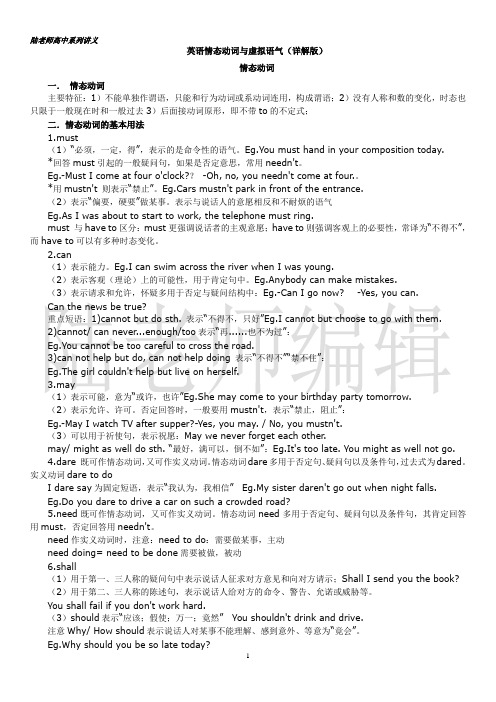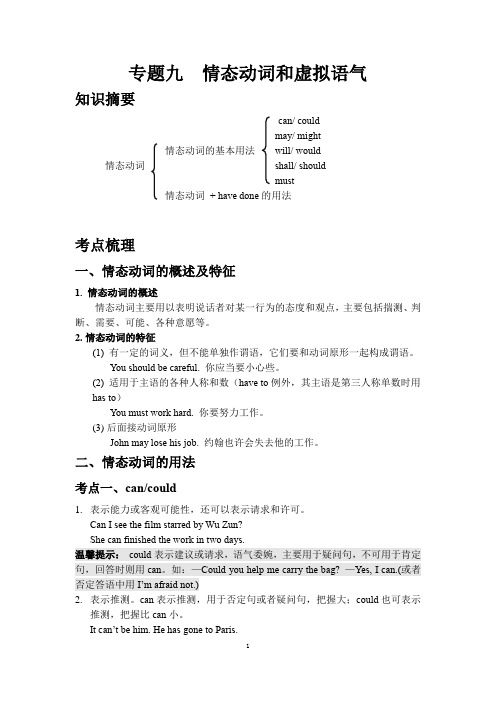情态动词、虚拟语气
中的情态动词和虚拟语气有哪些

中的情态动词和虚拟语气有哪些情态动词(Modal Verbs)是一类特殊的动词,在英语中常用来表达情态、态度、意愿、推测、能力、建议等含义,通常用来修饰其他动词。
而虚拟语气(Subjunctive Mood)是一种用来表示假设、愿望、建议、命令等非现实情况的语气。
情态动词一共有十个,它们分别是can、could、may、might、shall、should、will、would、must、ought to。
这些情态动词在语言表达中起到了很重要的作用,下面将对它们的具体用法进行介绍。
1. Can和CouldCan表示一种能力、可能性或许可性,用于表达某人能够完成某事。
Could表示过去或将来某个时间点的能力或可能性。
例如:- He can speak three languages fluently.(他能够流利地说三种语言。
)- Could you pass me the salt, please?(你能递给我盐吗?)2. May和MightMay表示许可、可能性或祝愿,用于表示允许某事发生或对现实情况的推测。
Might在语气上更加委婉,表达对现实情况的推测,表示较小的可能性。
例如:- May I borrow your pen?(我可以借用一下你的笔吗?)- I may/might go to the party tonight.(我可能今晚去参加派对。
)3. Shall和ShouldShall用于征询意见或提供建议,主要用于第一人称以及第三人称的单数和复数。
Should表示某事做起来更好,用于提出建议、义务或期望。
例如:- Shall we go out for dinner tonight?(我们今晚出去吃饭吧?)- You should take a break and relax.(你应该休息一下,放松一下。
)4. Will和WouldWill表示意愿、决心或预测,表示对未来的确定或实际情况。
虚拟语气与情态动词的区别及用法解析

虚拟语气与情态动词的区别及用法解析虚拟语气和情态动词是语法中两个不同的概念,但在一些语法规则和用法上有一些相似之处。
虚拟语气是一种用来表示假设、愿望、建议、要求等非现实情况的语气,它并不是真实存在的,而是对虚构的事件或状态进行描述。
而情态动词则是一类用于表示说话人的态度、推测、能力、许可等情态意义的动词。
一、虚拟语气的用法1. 假设虚拟语气经常用于表示虚拟的假设情况,即与事实相反或不可能实现的情况。
常见的虚拟语气形式包括“如果…(过去式)”,“要是…(过去式)”等。
例如:- If I were a bird, I would fly freely in the sky.如果我是一只鸟,我就可以在天空中自由飞翔。
2. 愿望虚拟语气还可以用于表示愿望,即对现实情况的一种虚构或想象。
常见的虚拟语气形式包括“希望…(过去式)”,“但愿…(过去式)”等。
例如:- I wish I had studied harder last night.我希望昨晚学习更努力一些。
3. 建议、要求虚拟语气还可以用于表示建议、要求等情况。
常见的虚拟语气形式包括“(要求、建议)+过去式”。
例如:- The doctor suggested that I take some rest.医生建议我休息一下。
二、情态动词的用法1. 表示能力、推测情态动词可以用来表示说话人的能力或对某种情况的判断。
常见的情态动词有can、could、may、might等。
例如:- She can swim very well.她游泳技术非常好。
2. 表示许可、允许情态动词还可以表示许可或允许的意思。
常见的情态动词有can、may等。
例如:- Can I borrow your pen?我能借用你的笔吗?3. 表示义务、应该情态动词也可以表示说话人对某种行为或义务的责任或要求。
常见的情态动词有should、ought to等。
例如:- You should apologize to him for your mistake.你应该为你的错误向他道歉。
情态动词和虚拟语气_高考英语_语法

Can you give me a lift to the station?
(5)有时会……(理论上的可能性)
The experienced teacher can make mistakes sometimes.
(6)固定搭配 1). cannot...too/enough 表示“无论„„也不
过分”“越„„越好”
month.
—Don’t worry.You________have it by Friday. A.could C.must
解析:
B.shall D.may
句意为:——我至今还没有拿到参考书,但是
下个月这个学科就要测试了。——别担心,周五之前你一定
会有的。本题考查情态动词。 shall 用于第二人称表示允诺、 要求、命令、威胁等语气,根据句意可知此处表示允诺的语
现在北京的公共交通非常便利,所以在市区
观光不应该有什么困难。
1.(2010· 浙 江 卷 )“You________have a wrong
number ,” she said ,“ There’s no one of that
name here.” A.need C.must B.can D.would
Would you mind if I opened the window?
(3)表示一种经常性、习惯性的动作
would可表示过去反复发生的动作或某种倾向,后面接表示动 作的动词,不能接表示状态的词; used to表示过去的习惯动作或状 态,强调现在已不存在。
Every morning he will have a walk along this river. Whenever he was in trouble, he would ask me for help.
情态动词与虚拟语气(详解版)(新版)

英语情态动词与虚拟语气(详解版)情态动词一.情态动词主要特征:1)不能单独作谓语,只能和行为动词或系动词连用,构成谓语;2)没有人称和数的变化,时态也只限于一般现在时和一般过去3)后面接动词原形,即不带to的不定式;二.情态动词的基本用法1.must(1)“必须,一定,得”,表示的是命令性的语气。
Eg.You must hand in your composition today.*回答must引起的一般疑问句,如果是否定意思,常用needn't。
Eg.-Must I come at four o'clock??-Oh, no, you needn't come at four.。
*用mustn't 则表示“禁止”。
Eg.Cars mustn't park in front of the entrance.(2)表示“偏要,硬要”做某事。
表示与说话人的意愿相反和不耐烦的语气Eg.As I was about to start to work, the telephone must ring.must 与have to区分:must更强调说话者的主观意愿;have to则强调客观上的必要性,常译为“不得不”,而have to可以有多种时态变化。
2.can(1)表示能力。
Eg.I can swim across the river when I was young.(2)表示客观(理论)上的可能性,用于肯定句中。
Eg.Anybody can make mistakes.(3)表示请求和允许,怀疑多用于否定与疑问结构中:Eg.-Can I go now? -Yes, you can.Can the news be true?重点短语:1)cannot but do sth. 表示“不得不,只好”Eg.I cannot but choose to go with them.2)cannot/ can never...enough/too表示“再......也不为过”:Eg.You cannot be too careful to cross the road.3)can not help but do, can not help doing 表示“不得不”“禁不住”:Eg.The girl couldn't help but live on herself.3.may(1)表示可能,意为“或许,也许”Eg.She may come to your birthday party tomorrow.(2)表示允许、许可。
高中英语语法系统讲解之八情态动词和虚拟语气

高中英语语法系统讲解之八情态动词和虚拟语气情态动词一. 情态动词的类型和特征1. 类型○1只作情态动词用的有:can(could),may(might),must,ought to。
○2可作情态动词也作实义动词的有:need,dare。
○3可作情态动词也作助动词的有:shall(should),will(would)。
○4具有情态动词某些特征的有:have(had)to,used to。
2. 特征情态动词有一定的词义,但不能单独作谓语,须和实义动词或系动词连用,构成谓语;且适用于主语的各种人称和数(have to例外),主语是第三人称单数时,要用has to。
二. 情态动词的基本用法1. can与could○1表示能力或客观可能性,还可表示请求和允许,她存在以下几种形式:如Children can be troublesome sometimes.○2表示惊异、推测、怀疑、不相信的态度(主要用于否定句、疑问句中)。
如This can’t be done by him.○3can的习惯用法A. can but的用法can but“只好,至多不过”,如We can but do our best.B. cannot help but,cannot help的用法二者都表示“不得不;不能避免;不禁”;但前者后加动词原形,后者加代词或动名词等。
如The girl couldn’t help but live on herself.When I try to speak, I can’t help making mistakes.C. cannot … too“无论怎样……都不过分;越……越好”如We can’t thank you too much for what you have done for us。
We can not be too careful to cross the road.温馨提示:○1can与be able to:can表示有能力做某事,be able to表示通过努力、克服困难做成某事。
情态动词和虚拟语气

情态动词与虚拟语气虚拟语气用来表示所说的不是事实,或者不可能发生的情况,而是一种主观愿望、建议、命令,推测或与事实相反的假设。
Eg.If everyone in the country knew first aid, many lives would be saved.If the hurricane had happened during the daytime, there would have been more deaths.虚拟条件句中if的省略:(were, had或should提前,形成倒装)Were I a bird, I would fly there. II.名词从句中的虚拟语气1.用于主语从句中用虚拟语气表惊奇、惋惜等,从句中谓语用(should)+V.1) It is necessary/ important/ natural/ strange/possible,/probable…that,It’s necessary that she (should) be careful. (她必须细心)2)It’s a pity/ a shame/ no wander/ better…thatIt’s a shame that you treat him like that.3) It is suggested/ requested/ desired/ proposed/ ordered…thatIt is suggested that she (should) study medicine. (建议她学医)2.用于宾语从句中1)在suggest, advise, propose, insist, desire, demand, request, order, command, vote, ask(要求)等表示愿望、建议、命令等动词后的宾语从句中,用虚拟语气表命令或请求等,谓语用(should)+V.A group was formed to demand that the bus company should change its unfair practices.(….改变不公平的做法)He asks that he (should) be given the chance.had done2)wish后的宾语从句:wish + did/werewould /might/could+do注;suggest表“暗示”“表明”时,insist “表坚持说/认为”,ask 表“问”时,从句用真实语气。
高中英语语法总结:情态动词和虚拟语气

高中英语语法总结:情态动词和虚拟语气考向1 情态动词一、 can, could与be able to1. 表示能力(体力、知识、技能)。
☞Can you lift this heavy box?(体力)☞Mary can speak three languages.(知识)☞Can you skate?(技能)此时可用be able to代替。
can只有一般现在时和一般过去式;而be able to则有更多的时态。
☞I’ll not be able to come this afternoon.当表示"经过努力才得以做成功某事"时应用be able to,不能用can。
如:☞He was able to go to the party yesterday evening in spite of the heavy rain.2. 表示请求和允许。
☞—Can I go now?—Yes, you can. / No, you can’t. 此时可与may互换。
在疑问句中还可用could, might代替,不是过去式,只是语气更委婉,不能用于肯定句和答语中。
☞—Could I come to see you tomorrow?—Yes, you can. (No, I’m afraid not.)3. 表示客观可能性(客观原因形成的能力)。
☞They’ve changed the timetable, so we can go by bus instead. This hall can hold 500 people at least.4. 表示推测(惊讶、怀疑、不相信的态度),用于疑问句、否定句和感叹句中。
☞Can this be true?☞This can’t be done by him. How can this be true?二、 may, might1. 表示请求和允许。
might比 may语气更委婉,而不是过去式。
语法中的情态动词与虚拟语气的用法

语法中的情态动词与虚拟语气的用法在语法中,情态动词和虚拟语气都是重要的概念。
它们在句子中起到不同的作用,用法也各有特点。
本文将详细介绍情态动词和虚拟语气的用法,并指导读者如何正确运用它们。
一、情态动词的用法情态动词是英语中的一类特殊动词,包括can、could、may、might、shall、should、will、would、must等。
它们通常用来表达说话人的意愿、能力、推测、建议等。
1. 表示能力与可能性情态动词can和could常用来表示能力和可能性。
例如:"She can swim."(她会游泳。
)"I could understand the movie."(我能理解电影。
)在这些句子中,can和could表达了能力与可能性的概念。
2. 表示推测与可能性情态动词may和might用于表示可能性和推测。
例如:"It may rain tomorrow."(明天可能会下雨。
)"She might be late for the meeting."(她可能会迟到会议。
)在这些句子中,may和might表达了对未来事件的推测。
3. 表示义务与建议情态动词should常用于表示义务和建议。
例如:"You should take a break."(你应该休息一下。
)"We should recycle to protect theenvironment."(我们应该回收以保护环境。
)在这些句子中,should表达了建议和应该做的事情。
4. 表示意愿与请求情态动词will和would通常用于表示意愿和请求。
例如:"I will help you with your homework."(我会帮你做作业。
)"Would you please pass me the salt?"(请你递给我盐吗?)在这些句子中,will和would 表达了说话人的意愿和请求。
语法篇专题情态动词和虚拟语气

用法
例句
can和could
表示能力
He can speak English better than you.
表示请求 或允诺?
You can have the book when I have finished it. Could you come again tomorrow?
表示客观可能性
should have done
过去本来应该……,而实际上没有……
The plant is dead. Maybe I should have given it more water.
ought to have done
过去本该……,而未……
You ought to have given him more help.
专题八 情态动词和虚拟语气
情态动词
一、情态动词 定义:情态动词是一种本身具有一定词义,但要与动词原形及其被动语态一起使用的词。它给谓语动词增添情态色彩,表示说话人对有关行为或事物的态度和看法,认为其可能、应该或必要等。 二、情态动词的特点 情态动词无人称和数的变化, 情态动词后面跟的动词需用原形,否定式构成是在情态动词后面加“not”。 个别情态动词有现在式和过去式两种形式, 过去式用来表达更加客气, 委婉的语气, 时态性不强, 可用于过去,现在或将来。情态动词属于非及物动词,故没有被动语态。
三、情态动词的语法特征 (1) 情态动词不能表示正在发生或已经发生的事情,只表示期待或估计某事的发生。 (2) 情态动词除ought 和have 外,后面只能接不带to 的不定式。 (3) 情态动词没有人称和数的变化,即其第三人称单数不加s。 (4) 情态动词没有非限定形式,即没有不定式,分词形式,也没有相应的动名词。 四、情态动词的基本用法
情态动词和虚拟语气

情态动词和虚拟语气情态动词主要用来表示说话人的情感、态度等,是中学英语语法的重点,也是高考的热点,是单项填空必考的一个知识点。
情态动词在近五年高考中主要考查四点:情态动词表示推测和可能性的用法;情态动词与虚拟语气;情态动词表达“情感、态度、语气等”;情态动词表示“必要性”等方面的用法。
虚拟语气的考点主要集中在名词性从句、条件句中的用法,以及错综条件句中虚拟语气的应用。
一、概念1.什么是情态动词本身有一定词义,是表达说话人的情感、态度、语气的词,其作用是给动词增添感情色彩②表现形式:情态动词+动词原形/be2.特点①没有人称和数的变化②不能直接跟宾语,必须搭配实义动词或be动词的原形③情态动词的过去式往往不表时态,而表示更加委婉的语气。
例句:Can/could you help me?2.情态动词的表现形式1)情态动词+do例句:We must help each other to overcome the difficulties.You shouldn’t be so careless.2)情态动词+be doing例句:She must be sleeping now.My mother may/might be cooking now 3)情态动词+be done例句:Difficulties can and must be overcome. Something must be done to stop pollution.4)情态动词+have done例句:You ought to have come earlier.They might have finished the work.二、情态动词的分类1.只能作情态动词:must, can/could, may/might2.可作情态动词也可作助动词的:will/would, shall/should3.可作情态动词有可作实义动词的:need,dare4.具有情态动词特征的:ought to, have to, beable to三、分类讲解1.can /could1)表示能力:会,在表示过去的能力时用could 例句:I can swim.Lucy can dance well and her mother could dance well when she was young.The cinema can seat 500 people.I could not read such an easy book when I was 7 years old.2)表允许,许可常用在口语中,此时could 不表示过去式,而表示语气上比can更客气。
情态动词与虚拟语气

情态动词与虚拟语气【语法要点】情态动词所谓情态动词是指它含有一定的含义,可以表达某种感情和说话的语气,但是它不可以单独使用作谓语动词。
学习情态动词主要学习英语国家的语言习惯和表达法,特别是在口语中不要过分追求原理,更不要不根据说话场合而进行推理,编造出一些语法结构正确的中文式英语。
一、情态动词的类型1.只作情态动词的有:must、can、could、may、might、ought to2.既可作情态动词又可作实义动词的有:need、dare3.既可作情态动词又可作助动词的有:shall、should、will、would二、情态动词的特征>1.表示说话人的情感态度,不能单独作谓语,与行为动词或连系动词一起作谓语。
2.情态动词没有人称和数的变化,后接动词原形。
3.具有助动词的特征:可用来构成否定句、疑问句或简短答语。
三、情态动词的用法1.表示能力(1)表示现在的能力,用can或be able to。
表示一般的能力时多用can,表示“经过努力成功的做成某事”用be able to。
(2)表示过去的能力,用could或was/were be able to。
区别同上。
(3)表示将来的能力,用will be able to。
2.表示推测、可能性(1)can用在肯定句中表示客观的可能性,而不表示具体事情实际发生的可能性。
—例如:Accidents can happy on such rainy days.(2)表示具体事情实际发生的可能性的情态动词,其表示可能性的层次如下表:注意→(1)may,must常用于肯定句,一般不用于否定句和疑问句。
(2)can常用于否定句,疑问句和感叹句中,表示疑惑、惊讶或不相信等意思。
could既可用于肯定句,又可用于否定句、疑问句中。
(3)would、could、should、might并不一定与过去时间有关,而是表示可能性弱于其相对应的现在时形式。
3.表示请求、允许、允诺(1)当你(们)代表你(你们)自己(I、we)或第三者(he、she、they)向对方(you)即决策者请示或提出建议时,使用:①shall/may/might/can/could I/We…②Shall he(she/they)…#③Would/Will/Could/Can you…could、might、would并不表示过去时间,而表示更委婉的语气。
情态动词和虚拟语气

谓语动词(情态动词、虚拟语气)要点一情态动词的基本用法【温馨提示】can有时也用于肯定句,表示理论上的可能性或一时的情况。
常译为“有时会”。
2.may,might【温馨提示】may表示请求许可时,其否定回答一般用mustn’t。
may not意为“可能不”,而can’t意为“不可能”。
【温馨提示】would表示过去的习惯时仅指动作,而且不与现在作对比;used to表示过去的习惯动作或状态,而且与现在作对比,说明现在这种动作或状态已经不存在。
4.shall,should,ought to5.must,have to【温馨提示】 (1)在回答must 的问句时,否定回答通常用needn ’t 或don ’t have to 。
(2) mustn ’t 表示“禁止;不许”;而don ’t have to 表示“不必”。
(3) must 只有一种形式,而have to 有人称、时态的变化。
6.need 的用法7.dare 的用法【温馨提示】(1)dare用作情态动词有dare,dared两种形式。
(2)dare用作实义动词,后接不定式,不定式符号to可省去,但dare以动词-ing形式出现时,不定式符号to不能省略。
要点二“情态动词+have done ”的用法1.must have done表示对过去已发生的事情进行肯定的推断,只用于肯定句中,意为“一定,必定”,其否定形式为:can’t/cannot have done。
It must have rained last night,for the road was quite wet.昨晚肯定下雨了,因为路面十分潮湿。
I saw Mr Wang just now.He can’t have gone abroad.刚刚我还看见王先生了,他不可能已经出国了。
2.could have done意为“本来可以……,本来能够……”,表示虚拟语气。
You could have made greater progress,but you didn’t try your best.你本来可以取得更大的进步,但是你没有努力。
情态动词与虚拟语气

情态动词与虚拟语气情态动词是英语中一类特殊的动词,它们用于表达说话人的情态、态度、能力、推测和意愿等,如can、could、may、might、shall、should、will、would、must等。
而虚拟语气则是一种语法形式,用来表示非真实、假设、愿望、建议、命令等。
情态动词和虚拟语气常常结合使用,以表达一定的假设、愿望或建议等含义。
一、情态动词的用法1. 表示能力和许可:can、could、may、might情态动词can表示一种能力或技能,表示某人有能力完成某事。
例如:He can play the piano very well.(他弹钢琴弹得很好。
)情态动词could表示过去的能力或技能,常用于否定句或疑问句中。
例如:I couldn't find my keys this morning.(今天早上我找不到我的钥匙。
)情态动词may和might表示允许或许可的意思,也可以表示推测或猜测。
注意may是一种程度上更强的允许,而might则程度上会稍微弱一些。
例如:You may leave the party early if you want.(如果你愿意,你可以早点离开派对。
)I might go to the movies tonight.(今晚我可能去看电影。
)2. 表示推测和猜测:must、should、would情态动词must表示说话人确定的推测和猜测,表示事实的推测,带有较强的肯定意义。
例如:She must be tired after running a marathon.(她参加完马拉松赛后一定很累。
)情态动词should表示一种合理的推测和猜测,表示根据某种常理或按照经验而做出的推测。
例如:He should be at home now because he usually comes back at this time.(他应该在家,因为他通常在这个时间回来。
情态动词与虚拟语气

情态动词与虚拟语气(一) 情态动词的基本用法1. can be able to could①can 和 be able to 都表示能力,意思上没多大区别。
但 can 只有现在和过去时,而 be able to 则有更多的形式。
但当成功地完成某一具体动作时,通常不用 could 而用was/were able to 来表示。
这时 was/were able to 相当于 managed to或succeeded in ,表示经过一番努力,终于能够完成某事。
如:The wounded man still was able to get to the village and was saved in the end.②can 和 could: can 和 could 都可以表示能力、技能、许可、建议或请求和可能性。
但比较委婉客气地提出问题或陈述看法,一般用 could,回答时则用 can。
如: Could you help me carry the bag? Can I help you?2. may/might①may/might 表示可能,但 may 比 might 可能性大。
如:—Why isn't he in class? —He may be sick.(生病的可能性较大) He might be sick.(生病的可能性较小)②may/might 表示"允许",may 用于现在时或将来时,might 常用在间接引语中表过去时,但 might 也可用于现在时间,表示比较委婉的语气,回答用 may。
如: He says we may leave. He said we might leave.③may / might 表示建议或请求, might 比 may 更客气,但意思更肯定而无过去时态的含义。
如:---May / Might I use your bike?---Yes, you can / may/ No,you mustn’t3. must /have to①must 表示必须,应该,强调主观意愿,没有时态变化。
情态动词和虚拟语气

专题九情态动词和虚拟语气知识摘要can/ couldmay/ might情态动词的基本用法will/ would情态动词shall/ shouldmust情态动词+ have done的用法考点梳理一、情态动词的概述及特征1. 情态动词的概述情态动词主要用以表明说话者对某一行为的态度和观点,主要包括揣测、判断、需要、可能、各种意愿等。
2.情态动词的特征(1) 有一定的词义,但不能单独作谓语,它们要和动词原形一起构成谓语。
You should be careful. 你应当要小心些。
(2) 适用于主语的各种人称和数(have to例外,其主语是第三人称单数时用has to)You must work hard. 你要努力工作。
(3)后面接动词原形John may lose his job. 约翰也许会失去他的工作。
二、情态动词的用法考点一、can/could1.表示能力或客观可能性,还可以表示请求和许可。
Can I see the film starred by Wu Zun?She can finished the work in two days.温馨提示:could表示建议或请求,语气委婉,主要用于疑问句,不可用于肯定句,回答时则用can。
如:—Could you help me carry the bag? —Yes, I can.(或者否定答语中用I’m afraid not.)2.表示推测。
can表示推测,用于否定句或者疑问句,把握大;could也可表示推测,把握比can小。
It can’t be him. He has gone to Paris.Look! Someone is coming! Who can it be?3.用于陈述句中,表示理论上或者习惯上的可能性。
It can be quite cold here in winter.It could be very exciting to go out for a drive.【知识拓展】1. 辨析:can、be able to 和could(1)can只有现在和过去时,而be able to则有更多的时态变化。
【高考英语】情态动词和虚拟语气(讲解)

语法专项情态动词一.情态动词的含义:情态动词只有情态意义,即表示说话人对动作的观点,如需要,可能,意愿或怀疑等。
情态动词主要有:can(could), may(might), must, shall(should), will(would), need, dare(dared), have to(had to),ought to, had better,would rather, used to等。
二.情态动词的特征:1.在形式上,情态动词没有实义动词的各种变化,只有could, would, had to, might, should等几个过去式。
其他如must, ought to等的过去式皆与现在式同形,且在各种人称后都用同样的形式。
2.在意义上,大多数情态动词有多个意义。
如can可表示“能够”,“可能”,“允许”等。
3.在用法上。
情态动词(除ought后接不定式外)与助动词一样,后接动词原形构成谓语动词。
三.情态动词的用法:(一)can/could的用法:1.表示能力:①表示现在的能力用can;表示过去的一般能力用could,若表示过去经过努力而做成某事,则用was/were able to do sth. 或managed to do sth. 或succeeded in doing sth.---Everyone here can speak English. (现在的能力)---A fire broke out in the hotel last night, but everyone was able to escape. (经过努力做成某事)②表示将来的能力常不用can,而用will be able to的将来时态:---I’ll be able to speak French in another few months.2.表示请求许可:若表示请求别人允许自己做某事,can/could均可,could表示委婉语气。
情态动词与虚拟语气知识点

情态动词与虚拟语气一、情态动词1.Can/could①表示能力:能/可以/会(could为过去式)②表示请求:可以(一般用于疑问句,could表示更委婉)注:could提问时,回答不能用could例:Could I smoke here?Yes,you can/No,you can’t③表示推测:不可能can't/couldn't(只用在否定句)注:表示推测时也可以用在疑问句或肯定句,但是很少,常见的例句:Can/Could it be true?That can/could be......2.may/might①表示请求:可以(一般用于疑问句,might表示更委婉)注:May提问,否定回答mustn't/can't②表示推测:也许(might比may可能性小)3.Must①表示命令/警告:必须(否定为mustn't“禁止”)注:must提问,否定回答needn't/don't have to②表示推测:一定(否定为can't“不可能”)4.will/would①用于构成将来时②表示意愿:会5.Need①实义动词need to do/need doing②情态动词(一般只用在疑问句或否定句)6.had better最好(注意否定had better not)7.Dare 敢(习惯接不定式,不过to也可以省略)8.Should ①应该②竟然注:ought to=should 应该9.have to 不得不Have to表示客观影响,must强调主观意愿10.be able to=canbe able to有时态变化,可以与其他情态动词连用,can不可以;另外,be able to更强调历经磨难,通过努力得到成功二、情态动词+have done1.三个推测(对过去的推测)①must have done:一定做了...②may/might have done:也许做了...③can't have done:肯定没做...2.could have done:本来能够做...例:You could have made greater progress,but you didn't.3.should/ought to have done:本该做...(却没做)4.needn't have done:本不必做...(却做了)5.Would have done:本会做...(实际上没做到)三、虚拟语气1.if的非真实条件句中例:①If I were you,I would accept his advice②If it rained/should rain/were to rain tomorrow,I would stay at home③If you had studied hard before,you would have passed the exam△if从句中,were/had/should可以放在句首(部分倒装),此时if必须省略,且否定词not不能放在前面例:①If I hadn't seen him then,I wouldn't have been very happy→Had I not seen him then,I wouldn't have been very happy②If I were you,I would accept his advice→Were I you,I would accept his advice2.错综时间条件句谓语动词根据句子本身的时态自行变化例:If you had followed my advice just now,you would be better now3.含蓄虚拟语气在某些介词存在的句子中,如果出现非真实的情况,要使用虚拟语气,常见的介词有:with/without/but for/or/but/otherwise等规则:例:①I was ill that day,otherwise,I would have taken part in the meeting②Without electricity,human being life would be quite different today4.wish与if only例:①I wish he could visit us tomorrow②If only you had listened to our advice!5.would rather(宁愿)/would sooner(宁可)/would as soon(宁愿)例:①I’d rather you came here tomorrow②I’d rather you hadn't told me the truth6.as if/as though例:①He looks as if he were an artist②He talked about the accident as though he had seen it7.用于建议(advise/suggest/propose/recommend)、命令(order/command)、要求(demand/require/request/desire/ask)、坚持要求(insist)、催促(urge)的从句中。
- 1、下载文档前请自行甄别文档内容的完整性,平台不提供额外的编辑、内容补充、找答案等附加服务。
- 2、"仅部分预览"的文档,不可在线预览部分如存在完整性等问题,可反馈申请退款(可完整预览的文档不适用该条件!)。
- 3、如文档侵犯您的权益,请联系客服反馈,我们会尽快为您处理(人工客服工作时间:9:00-18:30)。
情态动词、虚拟语气1. Grace doesn’t want to move to New York because she thinks if she there, she wouldn’t beable to see her parents very often.A. livesB. would liveC. having askedD. were to live2. We ______ the difficulty together, but why didn’t you tell me?A. should faceB. might faceC. could have facedD. must have faced3. Don’t handle the vase as if it ____ made of steel.A. isB. wereC. has beenD. had been4. I use a clock to wake me up because at six o'clock each morning the train comes by my house.A. couldn'tB. mustn'tC. shouldn'tD. needn't5. I’m going to Europe on vacation together with John if I ___ find the money.A. canB. mightC. wouldD. need6. We lost our way in that small village, otherwise we ____ more places of interest yesterday.A. visitedB. had visitedC. would visitD. would have visited7. Sorry, I am too busy now, if I _______ time, I would certainly go for an outing with you.A. have hadB. had hadC. haveD. had8. Days later, my brother called to say he was all right, but _______say where he was.A. mustn’tB. shouldn’tC. wouldn’tD. mightn’t9. — Happy birthday!—Thank you! It’s th e best present I _______ for.A. should have wishedB. must have wishedC. may have wishedD. could have wished10. We have bought so much food now that Suzie won’t be with us for dinner.A. may notB. needn’tC. can’tD. must n’t11. One of our rules is that every student wear school uniform while at school.A. mightB. couldC. shallD. will12. Jack is a great talker. It’s high time that he something instead of just talking.A. will doB. has doneC. doD. did13. If we _______ adequate preparations, the conference wouldn’t have been so successful.A. haven’t madeB. wouldn’t makeC. didn’t makeD. hadn’t made14. The new law states that people _ drive after drinking alcohol.A. wouldn'tB. needn'tC. won'tD. mustn't15. I got close enough to hear them speaking Chinese, and I said “Ni Hao” just as I ____ do in China.A. mustB. mightC. canD. should16.It’s quite warm here; we __________turn the heating on yet.A.c ouldn’tB. mustn’tC. needn’tD. wouldn’t17. We wouldn’t have called a taxi yesterday if Harold __________us a ride home.A. didn’t offerB. wouldn’t offerC. hasn’t offeredD. hadn’t offered18. Had they known what was coming next, they________ second thoughts.A. may haveB. could haveC. must have hadD. might have had19. ---____you interrupt now? Can’t you see I’m on the phone?--- Sorry Sir, but it’s urgent.A. CanB. ShouldC. MustD. Would20.__________ the clouds, you would find the airplane in the sky easilyA.Had it not been for B.If it were not C.If it had not been for D.Were it not for21. You ________ worry about it , as everything has been settled now.A.shouldn’t B.needn’t C.can’t D.mustn’t22. Why were you driving so fast? You somebody.A.might hurtB.might have hurtC.would hurtD.must have hurt23.—It’s the office! So you ________ know eating is no t allowed here.—Oh, sorry.A. mustB. willC. mayD. need24. But for their help, we ________ the program in time.A. can not finishB. will not finishC. had not finishedD. could not have finished25. Tom have come in person.He came such a long way just to tell us the result.A.mustn’t B.needn’t C.wouldn’t D.couldn’t26. Jam insisted that the book Mr Black referred to .A.was worth buying B.was worth to be bought C.being worth buying D.be worth buying27. We ________ last night , but we went to the concert instead.A. must have studiedB. might studyC. should have studiedD. would study28. -- I haven’t got the reference book yet, but I’ll have a test on the subject next month.-- Don’t worry.You ______ have it by Friday.A.shall B.could C.must D.may29. --- You a meal for me this evening. I had dinner at the Chinese Dragon with Tom.--- Well, why didn’t you phone and let me know?A.should cook B.needn’t have cooked C.don’t need to coo k D.should have cooked 30.—I wonder why Sara looks worried today.—I'm not sure,but she a small accident driving here.A. could haveB. might haveC. might have hadD. must have had31. The driver tried everything he could think of, but the car just not move.A.should B.might C.must D.would32. I am not going to sit here and let her abuse me.I demand that she immediately for what she justsaid.A.apologize B.would apologize C.apologized D.must apologize33. Great efforts to increase grain production if food shortages are to be avoided.A.could be made B.must be made C.might be made D.would be made34. It is important to know about the cultural differences that cause problems.A.must B.dare C.need D.may35. If only I _____ a few days ago!Then I wouldn’t have been feeling so worried now.A.looked ahead B.could look ahead C.were to look ahead D.had looked ahead36. ----- Can I pay the bill by check ?------ Sorry, sir. But it is the management rules of our hotel that payment _______ be made in cash.A. shallB. canC. willD. may37.–It’s really a pity that I didn’t see you in Shanghai.-- I _________ to see you in the hotel, but I was too busy.A.hope B.had hoped C.hoped D.am hoping38. _________ it rain, the crops would be saved.A.Will B.Should C.Would D.Could39. Rose ________ tell her mother that she didn’t pass the exam.A.dare not to B.doesn’t dare to C.doesn’t dare D.dares not40. She insisted that she ______ not guilty , but we insisted that she ____ into prisonA.was; be put B.be ; was put C.should be; was put D.was; should put41. Don’t play with the dog, Jack, for it ________ be dangerous at times.A. shallB. shouldC. canD. must42. ---A lice, let’s go to the supermarket and buy some food.---Sorry, Mike ____ come to see me this afternoon so I’d better stay at home in case he comes.A. canB. mayC. mustD. will43. Jack _________ the test again; in that case, his father will be very disappointed.A. must have failedB. might failC. should failD. could have failed44. It ______ heavily when he got back home for he was wet all over.A. was rainingB. must have been rainingC. must be rainingD. rained45. , we could forgive him for his mistakes!A.Were he still a child B.If he is still a childC.Did he realize he is wrong D.He were still a child46. My Mp4 player isn’t in my bag. Where I have put it?A.can B.must C.should D.would47. But for the help of my English teacher, I the first prize in the English Writing Competition.A.would not have won B.had not won C.would have won D.have won48. It is high time that the child to the hospital.A.is sent B.would be sent C.be sent D.was sent49. The man in prison insistent that he nothing wrong and set free.A.should do; should be B.had done; should be C.had done; had been D.should do; had been 50. It is usually warm in my hometown in March, but it be rather cold sometimes.A.must B.would C.should D.can51.He seldom listens to others. He answers for what he has done.A.shall B.will C.can D.would52. He paid for a seat, when he free.A.should have entered B.could have entere C.could enter D.would enter53. There be any difficulty in passing the road test since you have practiced a lot in driving school.A.mustn’t B.shouldn’t C.shan’t D.needn’t54. He have come here yesterday, he?A.mustn’t, did B.coul dn’t, has C.must, haven’t D.must, didn’t55. Why we eat out when can easily cook ourselves at home?A.must B.shall C.can D.may56. --- What it be?--- It be a man, for it is not moving. It be a dustbin, I think.A.can, may, must B.can, can’t, must C.can, must, can D.may, may not, could 57.—______ I lock the lab before I go home?—Don’t bother.I’ll check it myself later.A.May B.Must C.Can D.Shall58. ——Why didn’t you come to Simon’s party last night?—— I wanted to ,but my mom simply _________ not let me out so late at night.A. couldB. mightC. wouldD. should59. Jack described his father, who _______a brave boy many years ago, as a strong– willed manA. would beB. would have beenC. must beD. must have been60. I have told you the truth. ______ I keep repeating it?A MustB CanC MayD Will。
